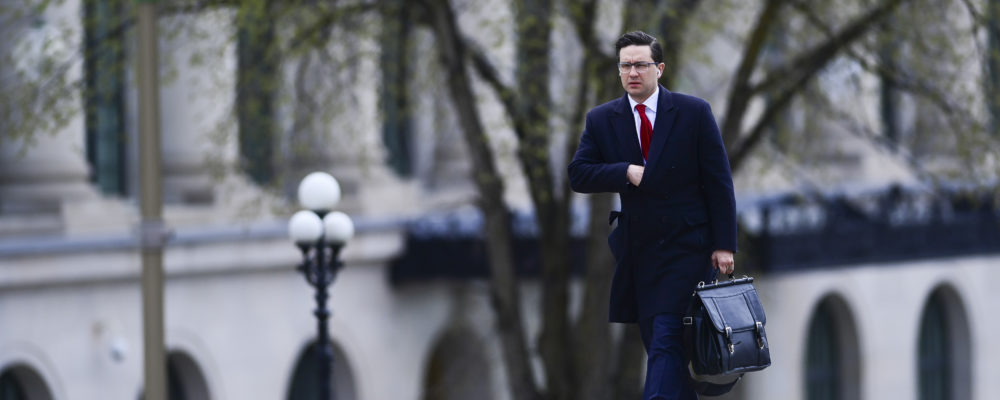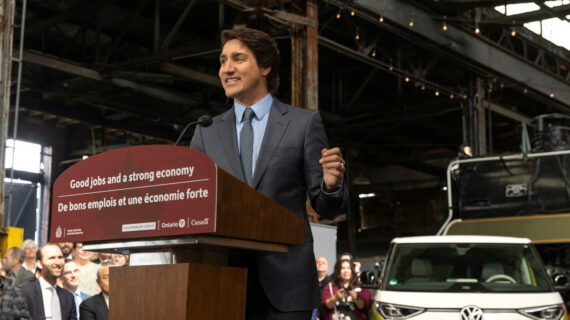Last week, the talented Ben Woodfinden contributed a thought-provoking piece to The Hub that pitched a winning strategy to Pierre Poilievre, the prohibitive favourite to become the next leader of the Conservative Party of Canada.
Woodfinden argued provocatively that Poilievre should continue to aim his rhetorical cannon at “the Gatekeepers”: an insular clique of powerful and well-connected interests who dominate Canada’s economic and cultural landscape—a sort of Laurentian Elite for the QAnon age. These gatekeepers hoard wealth and influence at the expense of everyday Canadians, who are struggling to pay off their student loans, buy their first houses, and keep their small businesses afloat nearly two years into a global pandemic.
Woodfinden sees in the gatekeepers narrative a rare opportunity for Poilievre to “thread the needle” in crafting a message that will resonate with both rank-and-file Conservative Party members, who will choose the party’s next leader, and a swath of critical swing-voters in the next federal election, namely aging millennials who have been locked out of home ownership, career stability, and other rites of passage taken largely for granted by their parents’ generation.
Woodfinden is one of Canada’s sharpest young political minds (you should check out his Substack if you haven’t already) and he has undoubtedly keyed into a populist wave that Poilievre can ride comfortably to his inevitable coronation as the Conservative Party’s next leader. However, I am less convinced that this message will take Poilievre all the way to the promised land.
Populism has never played well with a Canada-wide electorate, being antithetical to a risk-averse national political culture that prizes un-Americanness above all else. Woodfinden, a scholar of seminal Canadian political thinkers like George Grant, should be well aware of this fact. A few Gadsen flag-waving truckers in Ottawa and a handful of other major cities are unlikely to turn the tide of 155 years of Canadian political culture; Poilievre can only do further damage to his brand by hitching his wagon to the sort of sentiment that fueled last month’s “freedom convoys.”
Beyond this, Woodfinden seems to imply that the tattered “Harper coalition“—a once-unstoppable bloc connecting the multiethnic suburbs of Toronto and Vancouver with the Tories’ base in Western Canada—can be stitched back together with a smattering of pocketbook appeals to cash-strapped millennials. He seems willfully blind to just how thoroughly successive Conservative campaigns have torched bridges with dog-whistles aimed at Muslim and Chinese Canadians, among other non-“old stock” populations. These wounds will take more than a single election cycle to heal; and the myriad minority communities that have been alienated from the Conservative Party over the past seven years will not just be bribed back into the fold by a few wonkish housing policy proposals—proposals which, to begin with, are unlikely to elicit much enthusiasm outside of the darkened corners of “YIMBY Twitter”.
From a purely strategic standpoint, the Liberal Party’s crack data sciences team knows that the Conservative Party is angling for a Harper-esque breakthrough in southern Ontario and has set up an impenetrable firewall there (former Trudeau consigliere Gerald Butts gushed about the party’s “vote efficiency” following this past September’s election). Now former Conservative Party leader Erin O’Toole (MP for Durham) staked his political fortunes on rolling back Liberal gains in the Greater Toronto Area only to lose seats in the region. It’s high time for the Tories to scrap the Harper playbook and go back to the drawing board.
Fortunately, Mr. Poilievre can look to another major political figure from the early-2000s for inspiration: former NDP leader Jack Layton.
While many of us in English-speaking Canada will remember Layton as an avuncular figure—”the guy you’d like to have a beer with”—the NDP’s 2011 electoral breakthrough reflected a more calculated and Machiavellian side of Smiling Jack. Above all, the outcome was attributable to Layton’s hard-nosed strategy of peeling off votes from the left flank of the Bloc Quebecois. This strategy entailed a policy of deliberate ambiguity surrounding a number of thorny questions relating to national unity, most notably the margin of victory necessary to decide a future Quebec referendum, and a “don’t ask, don’t tell” approach to welcoming Quebec’s left-leaning nationalists, many of whom voted “yes” in the 1995 referendum, into the NDP fold. (A minor scandal erupted when Nycole Turmel, formerly a member of the separatist Quebec solidaire, became the leader of Canada’s Official Opposition after Layton’s failing health forced him to step aside).
Layton, who grew up just outside of Montreal and spoke flawless French, also took advantage of the relative isolation of Quebec’s media ecosystem. Rival Michael Ignatieff would later reminisce, not without a note of bitterness, that Layton had a “neat way of saying one thing in Quebec and another in the rest of Canada.”
Fast-forward a decade and the Bloc Quebecois has little reason to fear the NDP, whose current leader’s turban would get him fired from any number of public sector jobs in la belle province. In fact, the Bloc has been able to sail largely uncontested through the past two election cycles, with the Liberals content to coast on the Trudeau name and the Conservatives lacking anything that resembles a coherent Quebec strategy.
This lack of genuine competition has allowed the Bloc to get away without clearly articulating what it stands for, or even having to justify its very existence in a post-referendum national landscape. The party, established in 1991, was originally conceived as a temporary alliance of referendum-seeking separatists from across the political spectrum, but you would never know this from reading its most recent electoral platform, where the word “independence” did not appear even a single time. Bloc Quebecois leader Yves-François Blanchet proclaimed that he was “not very much interested in leading Canada” in last year’s English-language leaders’ debate.
Well, if the Bloc Quebecois has no aspirations to government and no timetable for Quebec’s next referendum, then I just have to ask, what exactly is the point of the Bloc?
The Bloc’s complacency presents a window of opportunity for Pierre Poilievre, who boasts Franco-Saskatchewanian roots and is one of the most effective French-language communicators in the Conservative Party’s frontbench. By actively campaigning against the Bloc, putting Blanchet on the defensive, and making the case to Quebec’s electorate that a Conservative government with a sizeable Quebec caucus would do more to advance their interests than an isolated and feckless Bloc Quebecois, Poilievre could give the Tories a fighting chance in Quebec. If there’s one thing that the 2011 election illustrated, it’s how soft Bloc support is when push comes to shove. A Poilievre-led Conservative Party would pull even with the Liberals by sweeping the 32 seats currently held by the Bloc Quebecois, a scenario not entirely outside of the realm of possibility.
Poilievre also has a powerful potential ally in Quebec Premier François Legault, arguably Canada’s canniest politician. Blanchet, who is just under a decade Legault’s junior, presents the most serious medium-term threat to Legault’s premiership—and leadership of the Bloc Quebecois has been a springboard to the premier’s office in the past (as, for that matter, has leadership of the federal conservatives). Legault has every reason to want to see his most formidable potential rival marginalized and reduced to a historical footnote. Moreover, Poilievre could drive a wedge between the Bloc and CAQ by goading Blanchet into uttering the “r-word”— it’s worth noting here that the Bloc’s sister party, the Parti Quebecois, has been reduced to an afterthought by a provincial electorate that has no appetite for another referendum.
The obvious wrinkle in this plan is that Quebec, by and large, leans to the left of the other Canadian provinces on most fiscal and social issues. At face value, the province does not present the most favorable ideological climate for self-proclaimed deficit hawk and “boy who cried inflation” Pierre Poilievre. However, the essential ingredients of a Conservative breakthrough in Quebec can potentially be found in last month’s protests.
Lost amidst the national media’s fixation on a small number of Confederate flags and Swastikas spotted at the protests were a much larger number of Fleur-de-lis; a good amount of French could be heard from protestors on the ground as well. The media has also been slow to draw a connection between the protests and Premier Legault’s draconian winter curfew, a rare miscalculation from a premier who generally knows which way the wind is blowing (merchandise that reads TRUCK LEGAULT can be found on a number of pro-convoy websites). Poilievre would be wise to sift through this stew of populist anger, where he may find a theme that can bring Quebec’s disaffected freedom fighters into the Conservative political fold.
Taking on the Bloc Quebecois on their home turf would be a risky gambit for a Poilievre-led Conservative Party, but at the very least it would be bringing something new to the table for a party that has struggled to break free from the “same old, same old.” At this point, what do the Conservatives have to lose—other than their status as Canada’s Natural Opposition Party?




